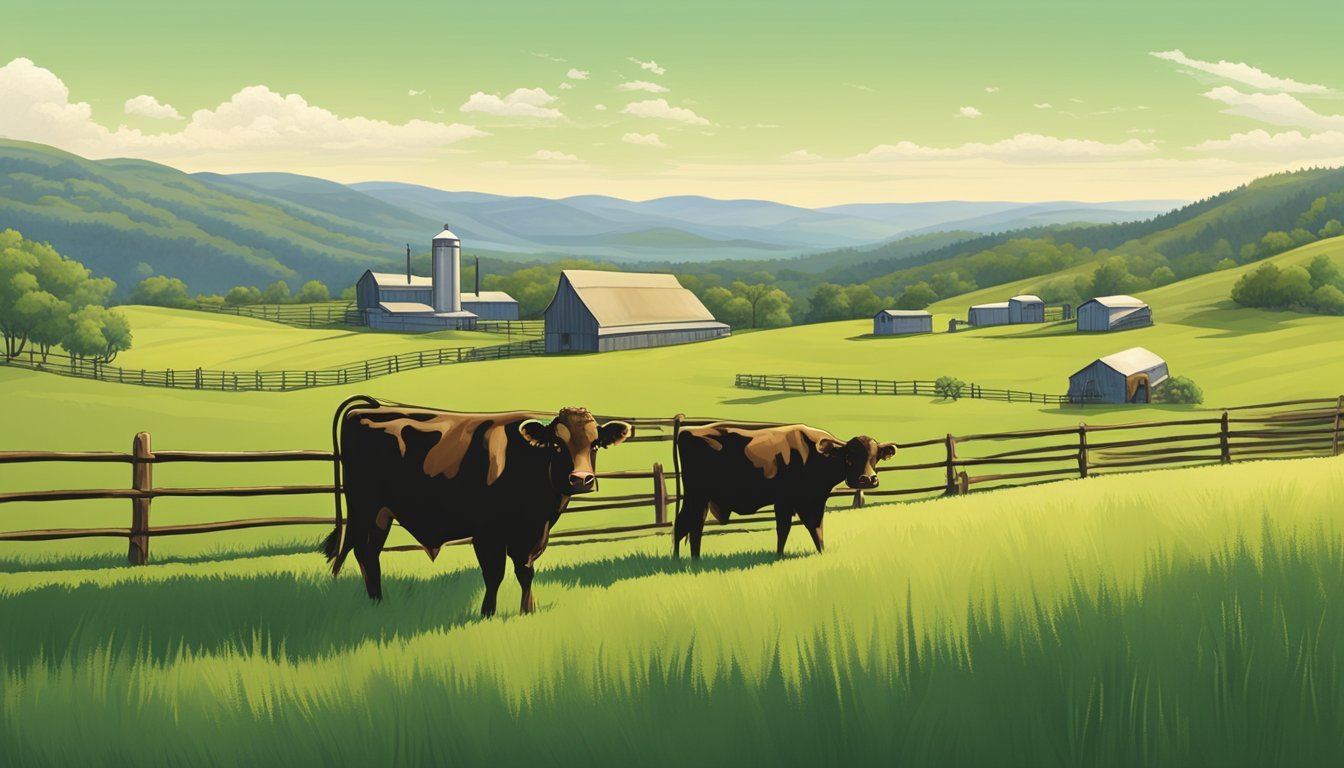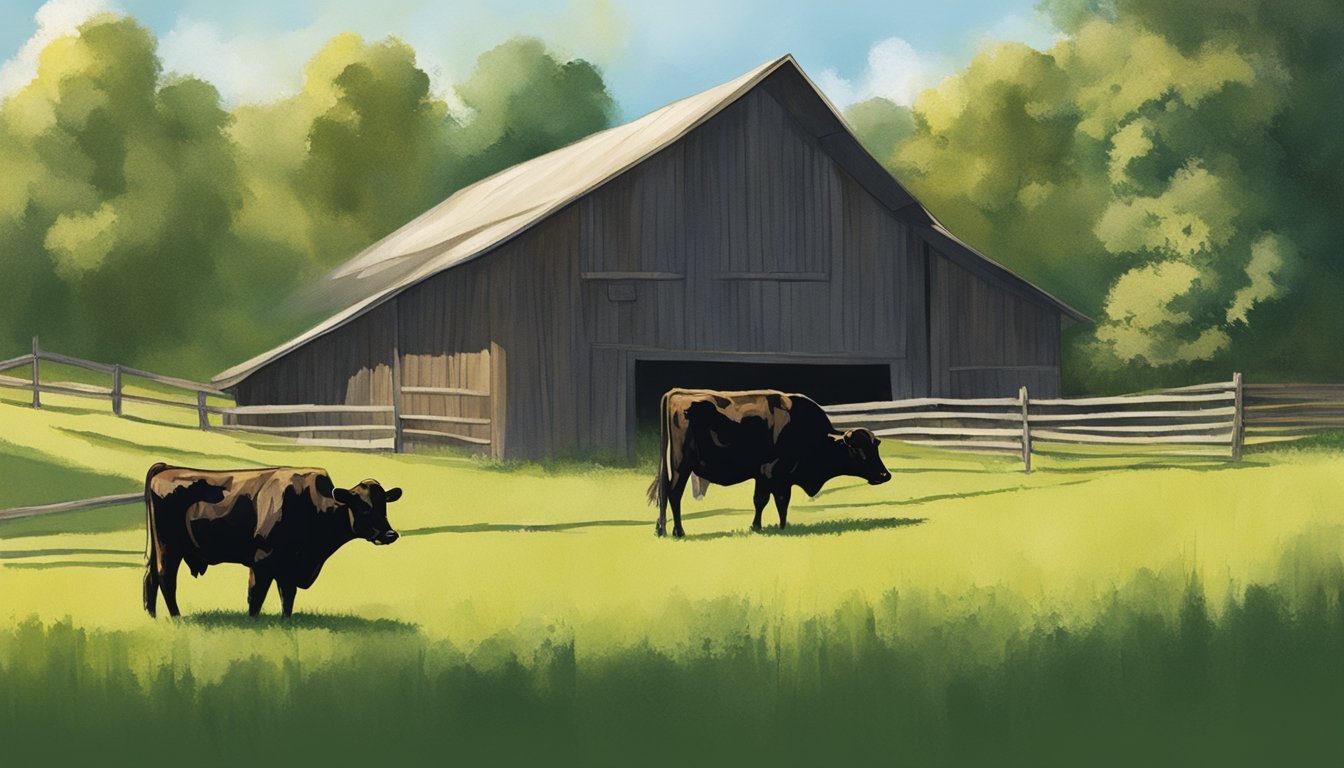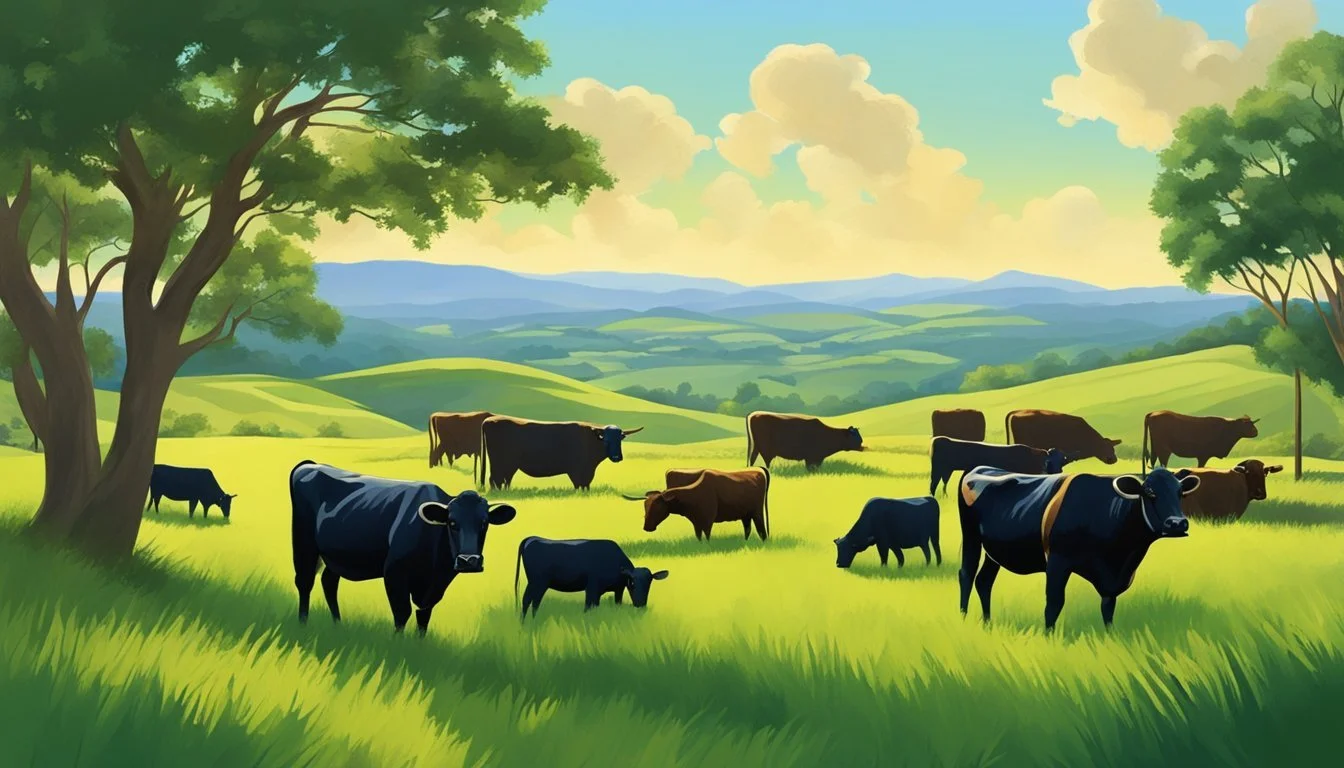Organic Dexter Cattle Farming
A Guide to Sustainable Practices
Organic agriculture is an approach that emphasizes sustainability, environmental preservation, and animal welfare while avoiding synthetic inputs such as pesticides, fertilizers, and genetically modified organisms. Within this framework, the breeding and farming of Dexter cattle have gained popularity among organic farmers due to the breed's adaptability and smaller size, which makes them well-suited for organic practices.
Dexter cattle, originating from Ireland, are a versatile breed known for their dual-purpose capabilities; they are raised for both milk and meat production. Organic Dexter cattle farming requires breeders to adhere strictly to organic farming principles, which include providing cattle with access to pasture, organic feed, and humane living conditions. This dedication to the organic methodology ensures that the meat and milk produced meet rigorous organic standards.
Among the essential practices in organic Dexter cattle farming is the management of grazing land to maintain soil health and biodiversity, as well as the careful selection of feed. Organic cattle farmers focus on providing a balanced diet rich in fibrous food such as fresh pasture, hay, and grass silage while minimizing the use of grains and concentrates. These approaches help maintain the natural behavior and health of the cattle, reduce environmental impact, and produce high-quality organic beef and dairy products.
Understanding Organic Dexter Cattle Farming
The niche of organic Dexter cattle farming merges the unique characteristics of the Dexter breed with rigorous organic farming principles. This synergy fosters sustainable agriculture while adhering to strict standards that benefit both the environment and consumer health.
History and Origin of Dexter Cattle
The Dexter breed originated in Ireland and is known for its hardiness and adaptability. Originally bred in the southwestern region of Ireland, Dexters were prized for their dual-purpose capabilities, providing both meat and milk. They are one of the smallest cattle breeds, a trait that is advantageous for organic farms with limited land resources.
Defining Organic Farming Principles
Organic farming prioritizes natural processes and cycles. It is characterized by:
Soil Management: Maintaining healthy soils through natural fertilizers and crop rotations.
Biodiversity: Encouraging a variety of species and natural habitats within the farm system.
Animal Welfare: Ensuring livestock have access to outdoor spaces, natural diets, and humane living conditions.
Prohibition of Synthetic Chemicals: Avoiding synthetic pesticides, herbicides, and fertilizers to maintain ecological integrity.
Dexter cattle fit organically within this framework due to their efficient grazing and ability to thrive on pasture without the need for synthetic inputs.
Certification and Regulations in Europe
To market organic beef in Europe, one must adhere to stringent EU organic farming regulations. These include:
IFOAM Standards: Following the standards set by the International Federation of Organic Agriculture Movements, which are recognized globally.
Inspections and Audits: Regular and comprehensive checks to ensure compliance with organic principles.
Traceability: A clear record of the animal's lifecycles, verifying organic status from birth to sale.
European organic certification assures consumers that Dexter cattle products have been produced in accordance with established organic agricultural practices.
Getting Started with Dexter Cattle
Dexter cattle offer prospective farmers a resilient and manageable breed for small-scale organic farming. Their hardiness and flexible dietary needs make them suitable for diverse climates and farm areas. Clear guidance is essential in establishing a thriving Dexter cattle operation.
Selecting Dexter Cattle for Farming
When choosing Dexter cattle, it's important to understand the breed standard which includes three colors: predominantly black, but also dun, and red. Farmers should select cattle based on genetic health, temperament, and conformation to breed standards. A key consideration is hardiness, as Dexter cattle are known for their robust nature, making them ideal for organic farming.
Housing and Shelter Requirements
Sheltering Dexter cattle necessitates providing a clean, dry, and ventilated environment. Housing should protect against harsh weather while allowing enough space for movement and socialization. A typical shelter might include:
Open barn: Providing natural ventilation and sunlight.
Dry bedding area: To ensure comfort and hygiene.
Sturdy fencing: For safety and containment.
Setting Up Your Organic Farm Area
An organic Dexter farm area needs thoughtful planning to maximize pasture use and maintain soil health. The farm should have:
Rotational grazing paddocks: To prevent overgrazing and promote grass recovery.
Natural water sources: Or clean and replenishable water systems.
Shade trees or structures: Offering protection from extreme weather.
Farmers must also adhere to organic farming principles, avoiding synthetic fertilizers and pesticides, and fostering biodiversity. Dexter cattle's adaptability makes them well-suited to organic practices, as they thrive on pasture-based diets that support organic farm area health.
Animal Husbandry and Health
In organic Dexter cattle farming, emphasis is placed on maintaining high standards of animal husbandry to ensure optimal animal health and welfare. Sustainable practices in nutrition, breeding, and disease prevention are key for the longevity and productivity of the herd.
Nutrition and Feed Management
Dexter cattle thrive on a diet that mimics their natural feeding patterns. Organic feed management for these animals involves:
Providing a diverse range of forages such as grasses and legumes, essential for their ruminant digestive systems.
Ensuring feed is free from synthetic chemicals and genetically modified organisms to comply with organic standards.
Implementing a rotational grazing system that promotes pasture recovery and nutritional variety.
Fertility and Calving Strategies
The fertility and calving practices for organic Dexter cattle involve:
Monitoring the cattle's breeding cycle closely to identify the optimal time for natural mating.
Calving on pasture whenever possible to reduce stress and allow for natural behaviors, aiding in the health of both cow and calf.
Maintaining detailed records of lineage and genetics to ensure the sustainable breeding of the herd.
Preventive Health Practices
Preventive health measures are the cornerstone of animal husbandry in organic farming. For Dexter cattle, this encompasses:
Regular health checks and vaccinations as per veterinary guidance to prevent common bovine diseases.
Keeping the stress levels of the herd low through adequate space, gentle handling, and stable social structures, which helps in reducing disease incidence.
Incorporating natural remedies where appropriate and in conjunction with veterinary advice, while avoiding the routine use of antibiotics and other synthetic medications.
Organic Farming Practices
Organic farming practices are rooted in a commitment to ecological balance and sustainability. These practices are designed to maintain soil fertility and health, effectively manage pests and weeds, and promote biodiversity through thoughtfully planned crop and pasture rotation.
Soil Management and Fertility
Proper soil management is critical in organic Dexter cattle farming. Soil fertility is primarily enhanced using organic matter and nitrogen-fixing crop rotations. It is common to find soils with 2% organic matter can hold approximately 40,000 lbs of organic matter per acre, thereby significantly contributing to nutrient availability.
Organic Fertilizers: Composted manure from Dexter cattle is a valuable source of nutrients. Its application helps to maintain and increase soil organic matter levels.
Nitrogen Sources: Leguminous cover crops, like clover, are often integrated into rotations to fix atmospheric nitrogen into the soil, reducing the need for external nitrogen fertilizers.
Pest and Weed Control
Organic Dexter cattle farms utilize natural strategies to manage pests and weeds without relying on synthetic pesticides.
Biological Controls: Beneficial insects and companion planting are employed to suppress pest populations.
Mechanical and Cultural Controls: Methods like mulching, manual weeding, and the use of flame devices are practiced to manage weed growth, all while ensuring the health of the soil is not compromised.
Crop and Pasture Rotation
Crop and pasture rotation is a foundation of organic farming practices, crucial for breaking pest and disease cycles and optimizing nutrient use.
Rotational Grazing: Dexter cattle are moved between pastures to allow for regrowth and to reduce the buildup of parasites and soil-borne diseases.
Diverse Planting: A diverse mix of forage crops is planted for the cattle, which contributes to soil health and reduces the risk of nutrient depletion.
Organic Dexter Cattle Nutrition
Optimal nutrition is essential for maintaining the health and productivity of organic Dexter cattle. They require a well-balanced diet that adheres to organic standards, with an emphasis on natural grazing and organic feed.
Feeding Strategies
Organic Dexter cattle predominantly graze on pasture, which must be managed without synthetic chemicals to meet organic certification. Grazing involves a rotation system to maintain grass quality and soil health, allowing pastures to recover before cattle regraze an area. This rotation not only benefits the cattle with a continuous supply of fresh fodder but also enhances the organic matter content and structure of the soil.
Supplementation with Minerals and Trace Elements
While grazing meets many of the Dexter cattle's nutritional needs, they may require additional minerals and trace elements to balance their diet. Common supplements include:
Selenium: Essential for preventing disorders like white muscle disease.
Copper: Important for growth, fertility, and immune function.
Organic farmers ensure these supplements are provided in natural forms, such as mineral blocks that cattle can lick, adhering to organic farming regulations.
Understanding the Role of Organic Matter
Organic matter in soil is critical for sustainable farming practices, as it improves soil structure, water holding capacity, and nutrient availability. Dexter cattle contribute to the cycling of organic matter through manure, which acts as a natural fertilizer. By maintaining pasture health through appropriate grazing practices, organic farmers support the ecosystem's natural balance, which in turn supports the cattle's health and nutrition.
Production Systems
The production systems for Dexter cattle are specialized paths that focus on maximizing the breed's potential for milk and beef production while maintaining sound breeding practices. These subsections delve into the specifics of each production system within organic Dexter cattle farming.
Milk Production from Dexter Cattle
Dexter cattle are known for their high-quality milk, which contains higher butterfat content than most dairy breeds, providing a rich ingredient for dairy products such as cheese and butter. Organic dairy farms ensure that the milk production process adheres to stringent standards, involving pasture grazing and organic feed, which help maintain the health of the cattle and the purity of the milk they produce.
Avg. Milk Yield: 1,500-2,500 lbs per lactation
Butterfat Content: Approximately 4%
Beef Production and Quality
When it comes to beef production, Dexter cattle offer lean and tender high-quality beef with excellent marbling. Organic beef farms focus on rearing cattle in a stress-free environment, allowing them to graze freely, which contributes to the overall superior quality beef. The meat from Dexter cattle is not only delicious but also tends to be lower in cholesterol compared to other breeds.
Average Carcass Weight: 400-500 lbs
Marbling: Well-distributed for premium quality
Breeding Programs for Improved Production
Effective breeding programs are integral to the success of both dairy and beef farms. They ensure genetic diversity, disease resistance, and improved productivity. Dexter cattle are typically easy calvers with good maternal instincts, making them ideal for organic farming systems. A structured breeding program focuses on genetic traits for milk yield, meat quality, and overall herd health.
Focus Traits: Milk yield, marbling, calving ease
Selection Criteria: Health, productivity, adaptation to organic farming practices
Parasite Management
Effective parasite management in organic Dexter cattle farming is critical for maintaining herd health and productivity. It encompasses timely detection and control measures, integrating strategies to minimize anthelmintic resistance.
Dealing with Gastrointestinal Worms and Liver Flukes
Organic farmers must adopt comprehensive strategies to manage gastrointestinal nematodes and Fasciola hepatica (liver fluke). Regular faecal egg counts are imperative to assess parasite burden. For gastrointestinal worms, rotational grazing and proper sanitation are key:
Rotate pastures to prevent the buildup of worms.
Allow rest periods for pastures to reduce larval counts.
Use clean pastures for weaning calves and other susceptible groups.
For liver fluke control, managing wet areas and snail populations is crucial as they are part of the liver fluke lifecycle.
Implementing Effective Monitoring Methods
Monitoring is vital for timely and effective parasite control. Farmers should utilize:
Faecal egg counts to evaluate the infestation levels in cattle.
Body condition scoring to assess the overall health and potential impact of parasites.
Grazing management records to determine the risk levels in different pastures.
This data aids in making informed decisions on when and where to implement control measures.
Anthelmintic Use and Resistance
While organic standards limit the use of anthelmintics, they may be necessary when other controls fail. To minimize anthelmintic resistance, farmers should:
Use anthelmintics judiciously, only when indicated by faecal egg counts and monitoring data.
Rotate between different classes of anthelmintics to reduce resistance selection pressure.
Combine drug treatment with other management practices to support overall parasite control efficacy.
Farmers must always be aware of the resistance status of parasites on their farm and adjust management practices accordingly.
Marketing and Economics
In the niche market of organic Dexter cattle farming, the economic viability hinges on effective marketing strategies and setting appropriate premiums to reflect the quality of the product. Farmers need to be aware of how consumer demand impacts price points and how brand reputation is essential for long-term success.
Understanding the Organic Meat Market
The organic meat market is characterized by consumers who are prepared to pay premium prices for products they perceive to be of higher quality, sustainable, and healthier. These consumers typically value production process transparency and environmental stewardship. They rely on certifications to guide their purchasing decisions, trusting in organic labels as a signifier of rigorous farming standards.
Setting Price Points and Premiums
When setting prices for organic Dexter beef, farmers take into account several factors including:
Production costs: Given that organic farming often involves more labor-intensive practices than conventional farming, costs can be higher.
Market demand: Taste, tenderness, and the nutritional profile of Dexter beef can impact consumer willingness to pay.
Certification: The value of organic certification can justify a higher price point due to the stringent standards that must be maintained.
Premium prices are often sustainable when the market recognizes and values the difference in product quality.
Building a Brand and Consumer Trust
Strong branding and consumer trust are crucial for the success of organic Dexter cattle products. Marketing strategies should include:
Educational campaigns: These utilize various media channels to inform about the benefits of organic Dexter cattle farming.
Transparency: Sharing practices and standards to bolster consumer confidence.
Quality assurance: Consistency in product quality ensures that premium prices are met with customer satisfaction.
Brand loyalty arises when consumers believe in the product's value and identify with the brand's ethos.
Sustainability and Environmental Impact
Organic Dexter cattle farming is recognized for its sustainable approach, emphasizing minimal environmental disruption while supporting the ecosystem. This section explores how these practices promote biodiversity, reduce pollution, and benefit the environment.
Promoting Biodiversity
Organic Dexter cattle farming practices contribute to the enhancement of biodiversity. By avoiding synthetic fertilizers and pesticides, these small-scale farms encourage a diverse set of organisms to thrive. Grass-fed Dexter cattle aid in seed dispersal and habitat creation, directly enhancing plant variety and supporting various wildlife species, which in turn maintains ecological balance.
Reducing Pollution and Environmental Footprint
Organic farming of Dexter cattle inherently aims at reducing pollution. Manure from organically raised Dexter cattle, managed through appropriate composting techniques, minimizes methane and nitrous oxide emissions. Dexter cattle require less pastureland due to their smaller size, which enables more efficient land use and less soil compaction compared to larger breeds, contributing to a smaller environmental footprint.
Benefits of Organic Dexter Cattle Farming to the Environment
Organic Dexter cattle farming presents several environmental benefits:
Soil Health: Grazing patterns of Dexter cattle improve soil fertility and structure, enhancing water retention and sequestering carbon, which is vital for mitigating climate change.
Water Conservation: Organic livestock farming employs practices such as rotational grazing that contribute to lower water usage compared to conventional farming methods.
By focusing on these environmentally conscious practices, organic Dexter cattle farming serves as a model for sustainability in the agricultural sector.
Labour and Management on Organic Farms
The success of organic Dexter cattle farming hinges on tailored labour strategies and incisive management practices that directly influence profitability and operational efficiency.
Daily Operations and Workforce
Organic dairy and mixed farms require a dedicated workforce that is well-versed in the specific needs of Dexter cattle. Daily operations encompass a range of activities from feeding and milking to maintaining hygiene standards and monitoring animal health. Dexter cattle, known for their hardiness and smaller stature, often necessitate less intensive care than larger dairy breeds, but strict organic standards demand meticulous attention to their living conditions and feed quality.
Cost Management and Profitability
Striking a balance between operational costs and revenue streams is central to managing an organic farm's profitability. Factors such as feed, veterinary care, and labor are predominant cost drivers. In organic dairy farming, these costs are generally higher due to the premium inputs required for organic certification. However, Dexter cattle can yield cost savings due to their adaptability to various climates and their efficiency in converting grass to milk, which can result in a favorable impact on the farm's bottom line.
Adapting to Technological Changes and AI
Incorporating advanced technologies and AI can lead to a significant shift in how organic farms operate. Leveraging data analytics for pasture management can optimize grazing patterns and improve milk yield. Meanwhile, AI-driven systems are being introduced to monitor animal health and detect early signs of disease, contributing to more sustainable and effective farm management. The adoption of such technologies must be compatible with organic farming principles—maintaining the integrity and ethos of the organic farming community.
Organic Dexter cattle farming operations must prioritize skilled labor, balance their books meticulously, and embrace beneficial technological advancements to remain viable in the competitive organic agriculture marketplace.
Challenges in Dexter Cattle Farming
Dexter cattle farming, while rewarding, comes with its own set of challenges that farmers need to address effectively, especially in the realms of health management and compliance with country-specific regulations.
Disease Prevention and Veterinary Treatment
Dexter cattle, like all livestock, are susceptible to a range of diseases. Disease prevention is critical and hinges on maintaining sanitary conditions, providing proper nutrition, and ensuring timely vaccinations. They may require specialized veterinary treatment for illnesses, which, if not managed properly, could lead to outbreaks affecting the entire herd. For example, measures should be taken to prevent the spread of diarrhoea, which can affect the health of herds rapidly.
Handling Parasite Resistance
A significant challenge in Dexter cattle farming is managing parasite resistance. Parasite management strategies generally involve rotational grazing and regular deworming programs. There is a growing concern of parasites becoming resistant to common deworming drugs, making it crucial for farmers to stay informed about the latest treatments and best practices, including the established withdrawal periods for any drugs used, to protect consumers and ensure the meat is safe for consumption.
Country-Specific Regulatory Challenges
Farmers must navigate varying country-specific regulations that can affect their farming practices. These may include rules about drug use in livestock, environmental regulations, and standards for organic certification. Regulations can vary widely from one country to another, and non-compliance can result in penalties or restrictions on sales. Understanding and adhering to these laws is vital for the successful and legal operation of a Dexter cattle farm.









